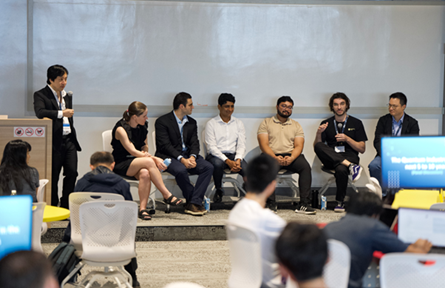Pre-University Science Educators engaged in Learning Journey at NTU
85 educators from various junior colleges and secondary schools had the exciting opportunity to embark on a Learning Journey at the NTU College of Science (CoS) on 21 June 2024. This learning journey was organised by the Institute of Advanced Studies (IAS) in collaboration with the four schools under CoS: the School of Physical and Mathematical Sciences (SPMS), the School of Chemistry, Chemical Engineering and Biotechnology (CCEB), the School of Biological Sciences (SBS), and the Asian School of the Environment (ASE).
The educators were presented with insights into NTU’s teaching pedagogies and a glimpse of the vibrant environment in CoS. This experience not only highlighted the practical applications of theoretical knowledge but also emphasised the commitment to fostering a hands-on, research-intensive environment that prepares students for future challenges in the various fields of science.
The event commenced with warm welcome addresses by Prof Sum Tze Chien (Director, IAS NTU) and Assoc Prof Loh Zhi Heng (Associate Dean, Academic, CoS) who emphasised the importance of constantly improving teaching pedagogies in this everchanging world; as different generations of students require new ways of keeping them engaged and excited in learning.
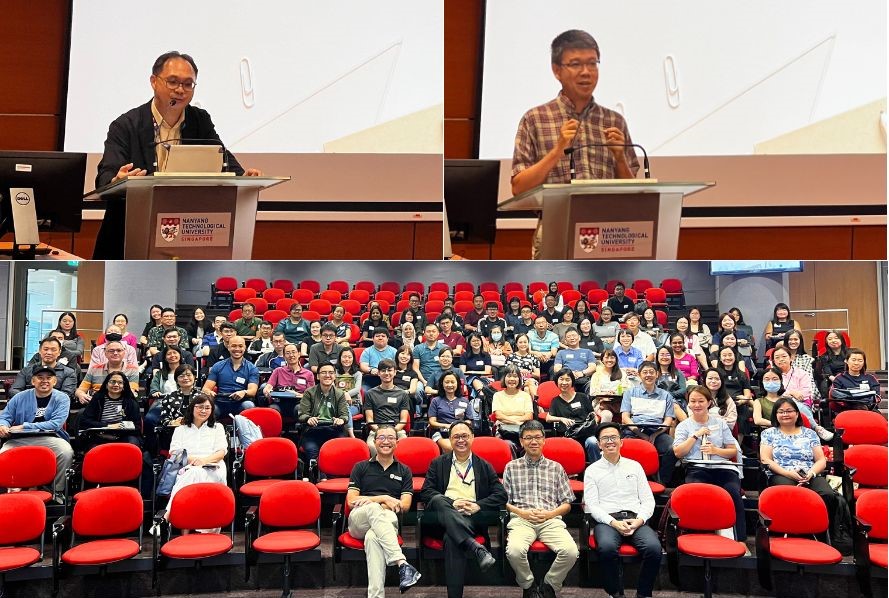 [Clockwise from top] Welcome Address by Prof Sum Tze Chien and Assoc Prof Loh Zhi Heng |Group Photo with our Learning Journey educators.
[Clockwise from top] Welcome Address by Prof Sum Tze Chien and Assoc Prof Loh Zhi Heng |Group Photo with our Learning Journey educators.
A series of insightful presentations followed, which delved into the courses offered, innovative teaching methods used with students, and engaging demonstrations for the educators in attendance. These presentations provided a comprehensive overview of the academic offerings and pedagogical strategies in the NTU College of Science.
Assoc Prof Justin Song (SPMS) gave an engaging talk on how to bridge the gap between textbook teaching and real-world applications from a physics perspective. Assoc Prof Tan Howe Siang (CCEB) shared the practical applications of technology in research and its potential to enhance students' learning experiences by integrating everyday technology into field studies. Assoc Prof Rebecca Case (SBS) presented the pedagogies used in the School of Biological Sciences and advocated the integration of real-world experiences and internships into the curriculum, which greatly enhance the understanding of biological concepts and processes. Meanwhile, Asst Prof Kim Hie Lim (ASE) highlighted the Asian School of the Environment's focus on immersive fieldwork to develop critical thinking, foster a deeper comprehension of academic material, and prepare students for future careers.
After the presentations from all four schools, the educators learned more about the various research and scholar programmes offered by CoS for undergraduates. Dr Koh Teck Seng presented on the Odyssey Research Programme, Associate Professor Andrew James Kricker shared on the Undergraduate Research Experience on CAmpus (URECA) programme, and Prof Gao Weibo introduced the CN Yang Scholars Programme.
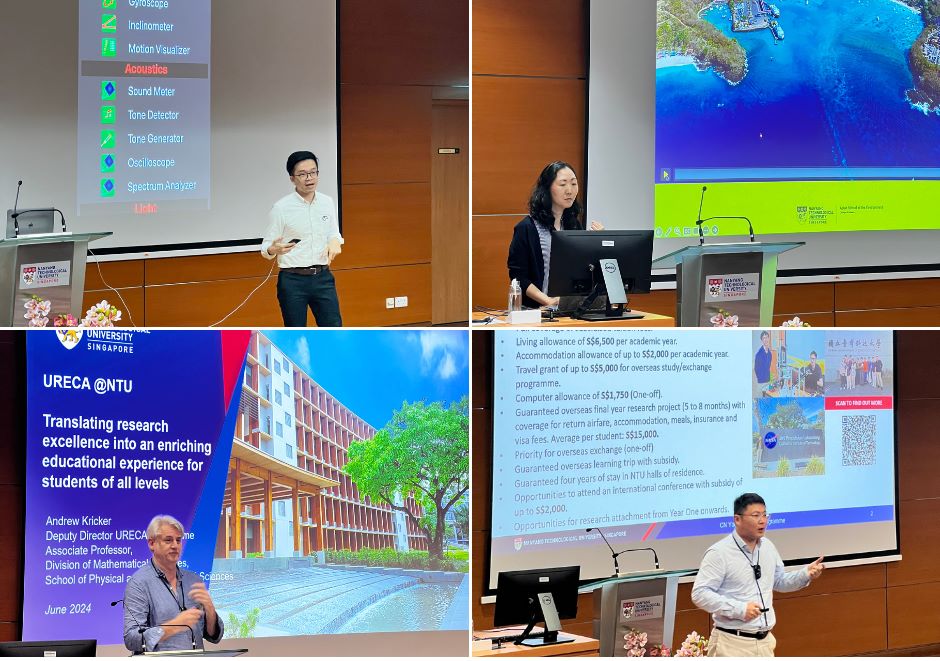 [Top row, from left] Assoc Prof Justin Song demonstrating how common everyday objects can aid in practical physics learning; Asst Prof Kim Hie Lim spoke passionately about ASE’s field work.
[Top row, from left] Assoc Prof Justin Song demonstrating how common everyday objects can aid in practical physics learning; Asst Prof Kim Hie Lim spoke passionately about ASE’s field work.
[Bottom row, from left] Assoc Prof Andrew James Kricker sharing on Undergraduate Research Experience on Campus; Prof Gao Weibo giving a talk on the CN Yang Scholars Programme.
During the casual lunch session, the educators were especially pleased to reconnect with their former students who are currently studying in NTU. These heartfelt reunions offered a special chance for both educators and alumni to reconnect and share valuable perspectives.
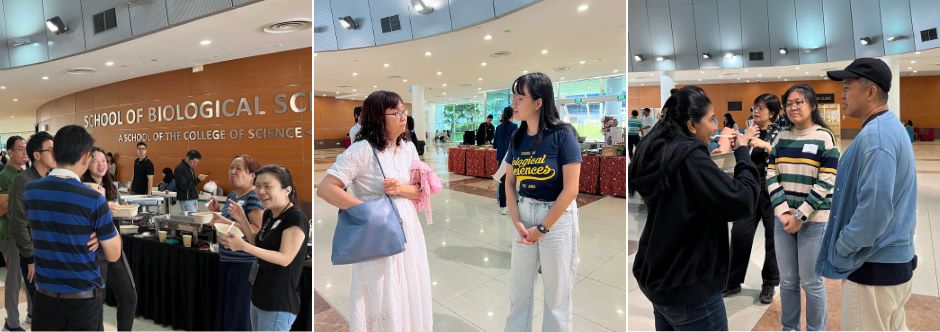 Joyous conversations over lunch, fostering connections and reminiscing about shared experiences.
Joyous conversations over lunch, fostering connections and reminiscing about shared experiences.
Following the lunch, the educators went on concurrent lab tours at the four CoS schools.
Asian School of the Environment (ASE)
Asst Prof Kim Hie Lim, along with four PhD students, showed the educators around the School, introducing the different undergraduate classrooms in ASE and sharing various real-world samples that undergraduates use during their lessons. The educators were guided through the state-of-the-art laboratories. The research conducted at ASE spans an extensive array of disciplines, encompassing everything from the study of magma movements to dung beetle behaviours.
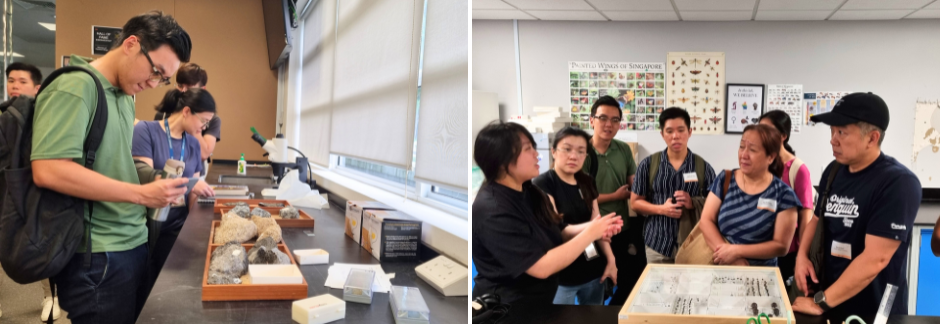 [From left] Observing rock samples at ASE; An impressive collection of dung beetle samples at the Tropical and Entomology Laboratory.
[From left] Observing rock samples at ASE; An impressive collection of dung beetle samples at the Tropical and Entomology Laboratory.
School of Biological Sciences (SBS)
Assoc Prof Linda Zhong (Director, Biomedical Sciences and Chinese Medicine) introduced the educators to the Bachelor of Chinese Medicine programme. She also conducted a tour of the Traditional Chinese Medicine (TCM) clinic, offering insights into the fundamentals of TCM practices. Following this, the educators were guided through the Plant Systems Biology and Evolution Laboratory by Assoc Prof Marek Mutwil who discussed his current research focusing predominantly on plant genomics. Lastly, Mr Lew Yi Liang (Teaching Lab, SBS) led the educators through the undergraduate teaching laboratories, providing an interactive experience of the various laboratory modules offered at the undergraduate level.
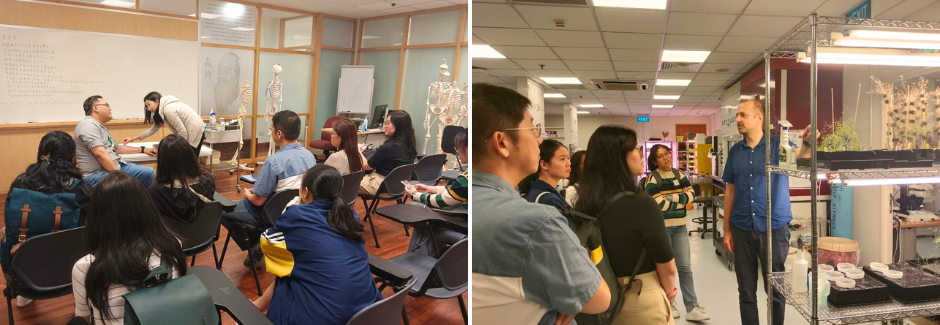 [From left] Assoc Prof Linda Zhong demonstrating basic techniques of Traditional Chinese Medicine; Assoc Prof Marek Mutwil sharing his ongoing projects to the educators.
[From left] Assoc Prof Linda Zhong demonstrating basic techniques of Traditional Chinese Medicine; Assoc Prof Marek Mutwil sharing his ongoing projects to the educators.
School of Physical and Mathematical Sciences (SPMS)
Assoc Prof Rainer Dumke Helmut introduced the educators to the Center of Quantum Technologies, where they immersed in a fascinating exploration of cutting-edge scientific advancements beyond traditional classroom settings. It was an eye-opening experience that broadened their understanding of quantum science and underscored the transformative potential and possibilities of quantum technologies across various fields.
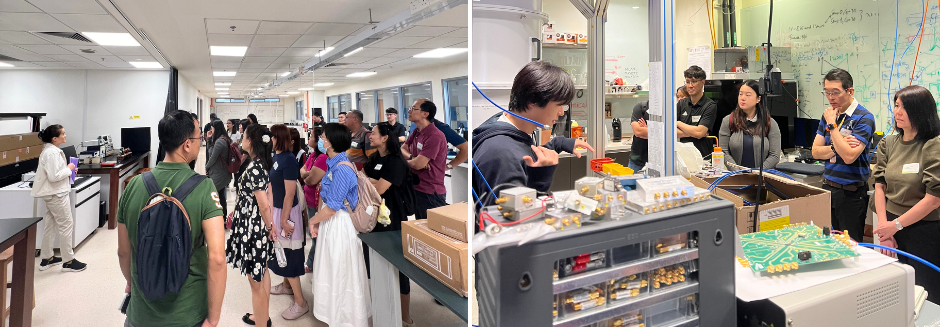 A fascinating tour around the Center of Quantum Technologies.
A fascinating tour around the Center of Quantum Technologies.
School of Chemistry, Chemical Engineering, and Biotechnology (CCEB)
Assoc Prof Tan Howe Siang showcased key instruments and equipment essential to research and coursework. The educators were introduced to various laboratories and viewed advanced facilities and ongoing chemistry projects, highlighting practical applications of theory to real-world studies.
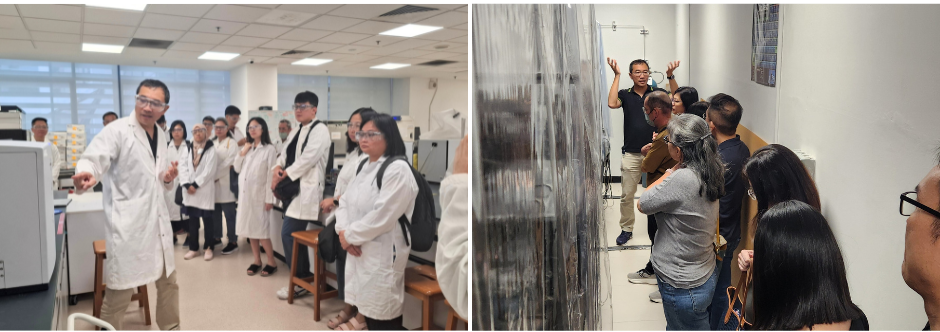 Assoc Prof Tan Howe Siang sharing insights about the undergraduate laboratory.
Assoc Prof Tan Howe Siang sharing insights about the undergraduate laboratory.
In the final segment of the Learning Journey, Prof Simon Redfern (Dean, CoS) and Assoc Prof Li Hoi Yeung (Assoc Chair, Academic, SBS) engaged in a sharing session with the educators, touching on several insightful themes. They emphasised the importance of better preparing pre-university students for the transition into a university curriculum structure. Educators at all levels impact essential skills such as innovation and the application of knowledge to real-world contexts, ensuring that students can contribute meaningfully to society beyond excelling academically.
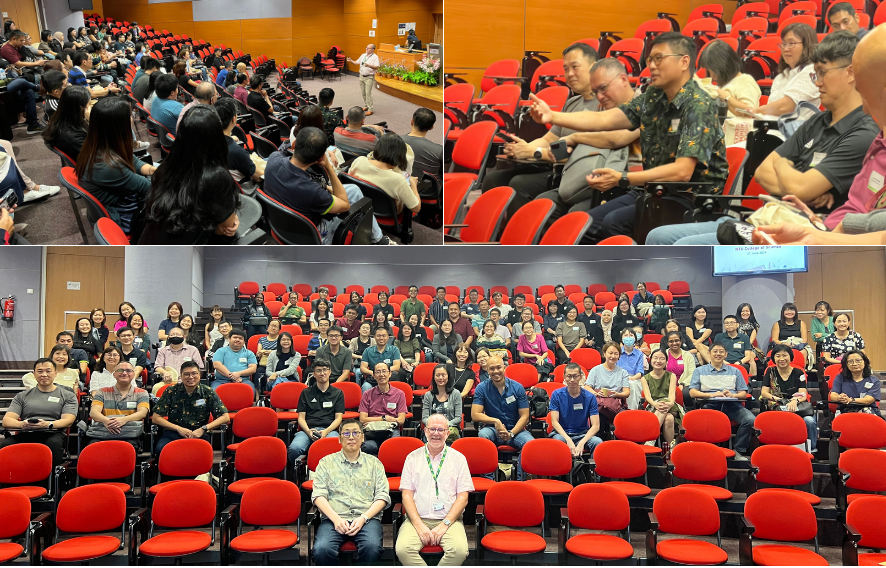 Sharing and wrap-up session led by Prof Simon Redfern and Assoc Prof Li Hoi Yeung .
Sharing and wrap-up session led by Prof Simon Redfern and Assoc Prof Li Hoi Yeung .
Some feedback from the educators:
“The sharing of the Odyssey programme by Dr Koh Teck Seng was intriguing and allowed insights into the experiences in trying to inculcate a culture of science with students.”
“The learning journey exceeded my expectations and I particularly enjoyed the passionate sharing by A/Prof Justin Song from SPMS on how to bring data into the classrooms, and the insights from A/Prof Kim Hie Lim from ASE on overseas field trip experiences and how students can learn from them.”
“Thank you for organising this learning journey. I enjoyed learning more about ASE during the lab tour. The PhD students who led the lab tour were very good and they readily answered all our questions!”
Written by Floretta Setia Pradana | CN Yang Scholar, SBS NTU














/enri-thumbnails/careeropportunities1f0caf1c-a12d-479c-be7c-3c04e085c617.tmb-mega-menu.jpg?Culture=en&sfvrsn=d7261e3b_1)

/cradle-thumbnails/research-capabilities1516d0ba63aa44f0b4ee77a8c05263b2.tmb-mega-menu.jpg?Culture=en&sfvrsn=1bc94f8_1)






